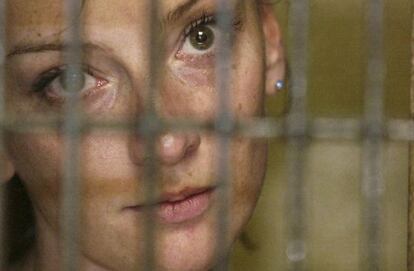“More than my freedom, I want my innocence”
Convicted kidnapper Cassez wants to help Mexico clean up its legal system


The most famous prisoner in Mexico and France doesn’t want her freedom. What she really wants is for everyone to believe what she has been saying for the past six years and five months — that she is innocent.
Florence Cassez wants people to know that she has never been a kidnapper, and that she does not know for sure that her former boyfriend, who is also in jail, was a member of a gang of powerful kidnappers.
What Cassez also wants everyone to know is that no one else has been through what she has gone through.
The 53-year-old Frenchwoman is serving a 60-year sentence for kidnapping at the Tepepan women’s prison in Mexico. On March 21, the Mexican Supreme Court ruled that the Federal Police violated her rights as an individual.
Each day, I am winning a battle. I always knew that I was going to win”
On December 9, 2005, her arrest and the supposed release of the hostages “she kidnapped” were broadcast on Televisa and TV Azteca — the nation’s two biggest broadcasters — but not via live transmission. It was a montage put together by a few reporters cooperating with the police and televised a day later.
Viewers saw Cassez and her boyfriend Israel Vallarta presented before the press as the arrested kidnappers who were the leaders of a powerful gang.
The Supreme Court justices will decide in August whether to give Cassez a new trial, but will have to limit the evidence that was used during the first trial because most of it was fabricated.
“Each day, I am winning a battle. I always knew that I was going to win,” Florence told EL PAÍS recently, in near perfect Spanish.
The top court’s ruling recommended her immediate release but it wasn’t approved by the full panel of justices.
The Supreme Court ruled in March that police violated Cassez’s rights
“Since four out of five justices said there were serious violations against me, a lot of people have given me their support not because I say it, but because the Supreme Court ruled it,” she said.
The Cassez case has been a sour point in Franco-Mexican relations. In 2009, then-President Nicolas Sarkozy traveled to Mexico to try to convince Mexican President Felipe Calderón to allow Cassez to serve out her term in her native France, but the offer was rejected.
In 2010, Cassez published a book, A la sombra de mi vida (or, In the shadow of my life), in which she described how she was arrested one day before the broadcast took place. The journalists used a fictitious location where they said the raid took place — a ranch situated about one kilometer away from the place where she was detained.
She also described how her lawyer promised to win her release, but it would take four years at a cost of 10,000 euros a month. Cassez said she spent two months in solitary confinement after prison authorities found a drawing by her father and accused her of using it as a model to plan an escape.
The book also details the inhumane conditions of the Mexican jail where she is being held and the contradictory testimonies of some of the witnesses who falsely testified against her.
“I will tell you when I actually win — the day the Mexicans decide to change this form of justice system that they have,” she said.
“It will be in 200 years when the Mexican people look back and say ‘look how this foreign woman made us look at our justice system. Thanks to her, nothing similar has occurred’.”
Asked if Calderón, whose mandate ends in December, would offer her the chance to serve out her sentence in her own country, Cassez said at this stage she would refuse the offer.
“I am innocent. I want everything that I have fought for to be worth it. This isn’t just for me, it is for all Mexicans.”
Although Cassez was quick to the point with all her answers, the only time she took a few seconds to think was when EL PAÍS asked her what she would say to President Calderón if he stood in front of her. “He is a lawyer, right? I would ask him why he didn’t read my case in the same way as [journalists and writers] Héctor Aguilar Camín and Héctor de Mauleón, or Arturo Zaldívar [the justice who asked that she be released]. I would ask him why he turned me into an international government issue. But the most beautiful thing I have seen is how the Mexicans have come out in my defense.”
Tu suscripción se está usando en otro dispositivo
¿Quieres añadir otro usuario a tu suscripción?
Si continúas leyendo en este dispositivo, no se podrá leer en el otro.
FlechaTu suscripción se está usando en otro dispositivo y solo puedes acceder a EL PAÍS desde un dispositivo a la vez.
Si quieres compartir tu cuenta, cambia tu suscripción a la modalidad Premium, así podrás añadir otro usuario. Cada uno accederá con su propia cuenta de email, lo que os permitirá personalizar vuestra experiencia en EL PAÍS.
¿Tienes una suscripción de empresa? Accede aquí para contratar más cuentas.
En el caso de no saber quién está usando tu cuenta, te recomendamos cambiar tu contraseña aquí.
Si decides continuar compartiendo tu cuenta, este mensaje se mostrará en tu dispositivo y en el de la otra persona que está usando tu cuenta de forma indefinida, afectando a tu experiencia de lectura. Puedes consultar aquí los términos y condiciones de la suscripción digital.








































